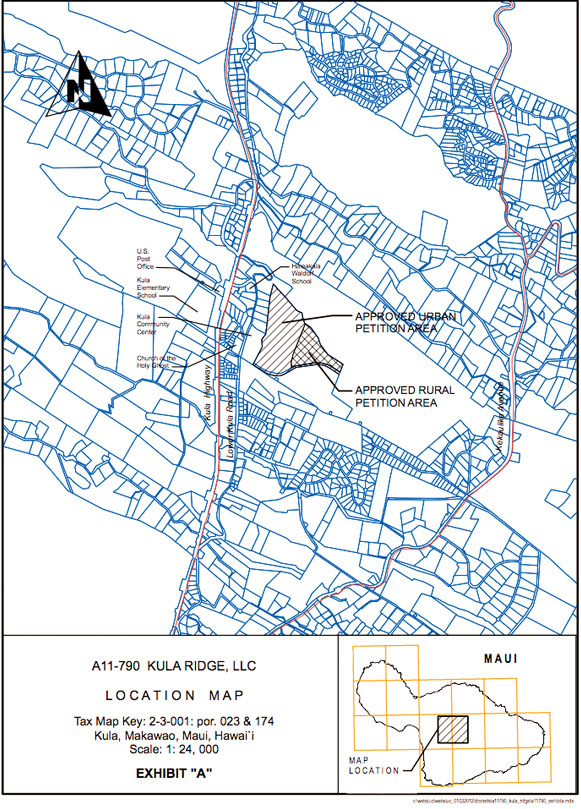Kula lands meant for housing revert to ag
Commission disappointed over loss of 70 affordable, 46 market-rate units

A map shows the location of what would’ve been the Kula Ridge development, a mix of 70 affordable and 46 market-rate units on 34.5 acres mauka of the Kula Community Center. After the developer failed to follow through on conditions set in 2012, the state Land Use Commission voted Wednesday to revert the land to agricultural use. Map courtesy state Land Use Commission
Lands intended for a Kula housing project that made headlines years ago but never moved forward were reverted to agricultural use on Wednesday, signaling the end of a development that would have generated 70 affordable and 46 market-rate homes.
Frustrated over the loss of housing but faced with few alternatives, the state Land Use Commission voted 6-0, with two members absent and excused, to revert about 51 acres of land in Kula to agriculture, after conditions set by the commission in 2012 went unfulfilled, including the development of affordable housing, traffic impact mitigation and water system improvements.
“I’m going to agree with this motion and the fact that all parties are agreeable to it, and yet it is with great hesitation that we withdraw the potential of having more housing units as stated on an island that is in desperate need of housing and in all economic levels, both affordable workforce as well as profitable housing,” commissioner Nancy Cabral said.
In 2012, the LUC allowed 34.5 acres of land to be redesignated from agricultural to urban and approximately 16.5 acres of land to be redesignated from agricultural to rural.
The $35 million project mauka of Kula Community Center had mixed reviews as it went through the approvals process about a decade ago. Upcountry residents who grew up with dreams of homeownership supported the project, but other community members had concerns over the availability of water, road safety and the possibility of Native Hawaiian burials being desecrated.
During the virtual commission meeting Wednesday, Maui County Planning Director Michele McLean noted that obtaining water was an issue for the project.
Clayton Nishikawa, a managing member of Kula Ridge, did not respond to requests for comment this week.
Attorney Jeffrey Ueoka, who represents the property owners, said Wednesday that the von Tempsky family of Upcountry sold the property to Kula Ridge but had to foreclose on it and take it back after Kula Ridge “did not perform.”
Ueoka said he’s not sure if the family has future plans for the property but that they are not developers and would not develop it themselves. However, the property could be sold in the future, he added.
Deputy Attorney General Alison Kato, representing the Office of Planning, said that the office reached out to both the state’s Hawaii Housing Finance & Development Corporation and Maui County, but both said they were not interested in taking over the project.
The Office of Planning, Maui County and the landowners did not object to the land being reverted to agricultural use.
Commissioners expressed frustration over the lost opportunity for much-needed housing as well as the lack of ways to hold developers accountable. But after toying with the idea of possibly keeping the lands “as is” and ready for development, commissioners felt that reverting the property to agriculture was the only option they had.
Commission Vice Chairman Edmund Aczon said that developers and property owners come to the commission and promote “all of these good things,” such as jobs and housing.
“But yet when they don’t deliver, the Land Use Commission is being blamed” for the lack of housing and development, he said.
“I’m just kind of frustrated things like this happen, yet our hands are tied,” Aczon said.
The Maui County Planning Department told the commission that it does not plan to take aggressive enforcement action against the developer for not meeting the conditions and following through with the project.
McLean said developers did not take the expensive process lightly and that an applicant would not go through such an entitlement process if they did not fully intend to develop the project.
McLean, who has also worked in the private sector with a real estate development company, said that after the entitlement process is done, developers face the realities of installing infrastructure and the cost of financing and development.
“That reality must have hit really hard,” she said.
Chairman Jonathan Likeke Scheuer said that “in this particular case, there is not much we can do.”
But he said the commission would like to know how much housing has been promised to each county and how much has been delivered.
The only public testimony on the subject on Wednesday came from Maui’s Dana Naone Hall, who supported the reversion and called the project “ill advised.”
Hall, who opposed the project years ago, was and still is concerned about the protection and preservation of the unique historic sites and complexes on the property. She is also concerned about water infrastructure.
“Sometimes, not often, approved projects, which faced strong opposition over a long period of time, prove to be unfeasible and are withdrawn, without the need for acrimonious and expensive contested case and appeals,” Hall wrote. “The Kula Ridge project is on track to becoming one of these rare projects.”
* Melissa Tanji can be reached at mtanji@mauinews.com.
- A map shows the location of what would’ve been the Kula Ridge development, a mix of 70 affordable and 46 market-rate units on 34.5 acres mauka of the Kula Community Center. After the developer failed to follow through on conditions set in 2012, the state Land Use Commission voted Wednesday to revert the land to agricultural use. Map courtesy state Land Use Commission

